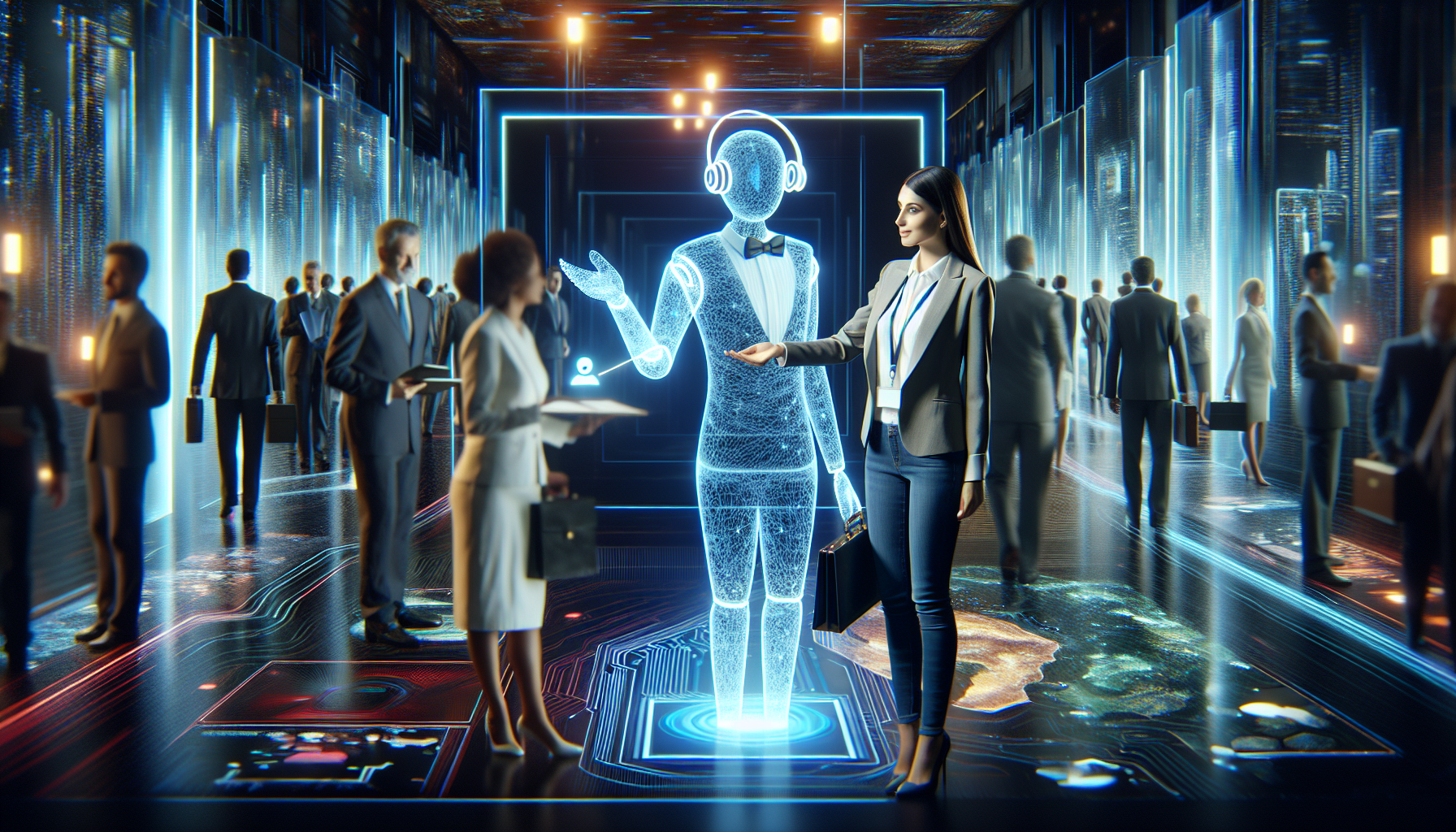
The digital age is continuously evolving, replacing traditional systems with sophisticated advancements. One such innovative intervention is the introduction of AI Receptionists in virtual events. Just as a human receptionist would manage attendees at a physical event, an AI-based one enhances the experience of attendees in a virtual event with smooth, automated interactions. As virtual events progressively become the new norm, such artificial intelligence-driven customer servicing solutions are revolutionizing the event management landscape.

AI Receptionists are programmed to interact with attendees in a realistically human manner. They guide visitors right from registration, help answer queries throughout the event, direct attendees to different sessions, and even collate feedback post-event. By providing immediate responses, they drastically improve the attendee experience by resolving issues and providing information in real-time.
Many event management platforms are now integrating AI receptionists, understanding their role in alleviating attendee experiences. The surge of such AI technology in virtual events is not only a testament to tech-driven efficacies in event handling, but also the future potential it carries in redefining customer satisfaction.
Thus, AI Receptionists serve as a revolutionizing key, enhancing virtual attendee experience, thereby marking a landmark shift in the event management sector.
With technological advancements providing a bridge to a customer-service oriented future, the early implementation of such AI receptionists can catapult organizations ahead in the global market. The virtues of automated efficiency and real-time responses provided by AI receptionists at virtual events are raising the bar of customer satisfaction, making them an indomitable tool in the management of virtual events.
In the ever-evolving landscape of virtual events, the integration of artificial intelligence (AI) has brought about significant improvements in multiple facets. Of particular interest to event organisers and attendees alike is the concept of AI Receptionists. These cutting-edge tech solutions play a fundamental role in enhancing attendee experiences, especially in the realm of registration and check-in.
For event organisers, the goal is always to streamline the event registration process and reduce wait times - hurdles that can dampen an attendee’s first impression with frustrating delays. Enter, AI Receptionists (source). These digital 'hosts' employ advanced machine learning algorithms to facilitate seamless registration and efficient check-in, thus freeing up human resources for other critical tasks.
Unline traditional methods, AI Receptionists are not restricted by operating hours or the number of attendees. This means that your attendees can register and check-in remotely, at their own convenience. Moreover, the automated nature of these systems provides an additional boon: error-free data entry and rapid attendee validation (source). No more incorrect badge names or check-in hiccups. The potential for improved attendee experience is immense.
Furthermore, faced with a global pandemic, the need for contactless solutions has awakened the potential of AI Receptionists in a new context. By minimising physical interaction, AI Receptionists are providing safety measures that are a praerequisite in a COVID-ridden world (source). Thus, attendees are not only enjoying a streamlined experience but are also presented with the reassurance of a safe event environment.
The rise of AI Receptionists marks a promising trajectory in the world of virtual events. Featuring the right blend of efficiency, convenience and safety measures, these advanced tech solutions are undeniably enhancing the attendee experience. As the potential of AI continues to be harnessed, it is an exciting era for event management. AI Receptionist, the future is indeed here.
As virtual events grow ever more popular, the need for efficient and instant communication systems has prompted the rise of AI receptionists. These virtual assistants not only ensure a seamless and immersive experience for attendees at live events, they also act as dynamic instruments of real-time assistance, promptly responding to attendee inquiries and managing FAQs effectively.

An AI receptionist proves valuable by managing to be 'everywhere', offering immediate replies and providing accurate information when it is crucial. This eliminates the delays often associated with human intervention, delivering attendees the satisfaction of instant service and fostering a more positive event experience.
FAQ Management is another area where AI receptionists truly excel. Event planners can program these intelligent aids with a vast repository of predetermined responses to common inquiries. This not only ensures that common questions are addressed accurately, it helps release the burden from human receptionists, allowing them to focus on complex and unique queries. Given their capacity to learn and adapt, AI receptionists can also study the patterns of frequently asked questions and subsequently enhance their own knowledge base, evolving to serve future events with greater efficiency.
Moreover, due to their inherent objectivity, these AI tools minimize the risk of giving out inconsistent information. Thus, attendees get unbiased, accurate responses every time, leading to a smoother, uninterrupted event experience.
In conclusion, AI receptionists in virtual events not only enhance attendee experience through real-time assistance and comprehensive FAQ Management but also add to the efficiency and effectiveness of each event. As we continue to evolve in this virtual landscape, businesses that leverage these innovative technologies will undoubtedly stay ahead of the curve.
As the digital landscape continues to evolve, AI receptionists are leading the frontier in virtual events. Their capabilities are not merely limited to interactivity and reducing manual workload but extend significantly to seamless integration with existing event management tools.
Virtual events often require complex logistics and coordination. This is where AI receptionists come into play by effortlessly integrating with the preferred event management platforms
One of the most impactful ways AI receptionists enhance the attendee experience is through schedule synchronization. Without leaving the event interface, attendees can get real-time updates about upcoming sessions or changes in schedule. These smart agents can integrate their internal algorithms with the event’s calendar tools and ensure information is delivered timely and accurately.
Moreover, these AI-powered entities specialize in managing reminders for attendees. Forget manually setting reminders or worrying about missing an important session. The integration feature allows the AI receptionists to send reminders via emails, app notifications, or text messages, providing maximum convenience to the users.
Beyond that, the AI receptionist can also take over the task of attendee communications. From event registration confirmation, inquiry handling to post-event follow-ups, the AI receptionist can integrate with automated marketing tools to streamline the communication process. As a result, attendees get a personalized, seamless experience that enhances their satisfaction and engagement towards the event.
In essence, the role of an AI receptionist goes beyond plain conversation and interaction. It's an impressive display of tech-intelligence that perfects event management by integrating with various tools, and thereby, enriching the attendee experience.
When the curtain falls on a virtual event, a key question for organizers is how to maintain the momentum generated by the gathering. This challenge is one that event technologies seek to address, and one solution that shines brightly in this arena is AI receptionists. Not only do they provide streamlined experiences during events, but they significantly enhance post-event engagement, too.

One of the most common post-event engagement activities are follow-up surveys. Gathering attendee feedback is crucial for gauging event success and planning future improvements. However, attendees may feel overwhelmed by long survey links or email forms. Here, AI receptionists can step in. They can interact with event-goers in a more personalized and conversational manner, making surveys feel less tedious and more engaging. Furthermore, with the ability to analyze large amounts of data effectively, AI receptionists can process and present these survey results in a meaningful way.
Following up with thank you messages can also help improve attendee experience. An AI receptionist can automate and personalize these messages, making each attendee feel valued and acknowledged. The messages can be further enhanced with mentions of relevant highlights, presentations, or upcoming events, stimulating continuous engagement with the brand or organization.
Perhaps the most enduring function of AI receptionists in enhancing post-event engagement revolves around continuous engagement. These AI-powered bots can answer follow-up questions, share additional relevant content, send reminders for upcoming events, and facilitate ongoing discussions on event topics. By doing so, AI receptionists help to extend the lifespan of an event, keeping attendees engaged and connected even long after the event has ended.
There's no question that post-event engagement is vital for the success of any event. With the help of AI receptionists, event organizers can ensure that they continue to connect with their attendees, enhancing their experiences and building enduring relationships.
The advent of advanced technology has revolutionized the event landscape, making it more engaging and immersive than ever before. Foremost among these developments is the integration of advanced AI features that act as virtual receptionists, augmenting attendee experience and making events seamless and enjoyable.
One of these advanced features is natural language processing (NLP). The integration of NLP into virtual assistant platforms enables AI receptionists to understand and process human language in real-time. Attendees can interact with these AI receptionists in natural, human-like conversation, enhancing their event experience.
Moreover, the personalized attendee interaction, offered by AI receptionists, transforms generic, impersonal virtual hangouts into dynamic, individualized experiences. IBM's Watson, for example, leverages machine learning to accumulate knowledge about each attendee's preferences and interests over time, providing tailored interactions that feel authentic and individualized.
Other features such as the AI receptionist's ability to manage large amounts of data in real-time, guide attendees through the event, and instantly answer any queries, present endless possibilities to enhance attendee experience at virtual events. Through a mix of sophisticated technology and human-like engagement, AI receptionists are redefining attendee experiences at virtual events.
In conclusion, leveraging advanced AI receptionist features like natural language processing and personalized attendee interaction not only enhances the overall experience of your event attendees but also helps your event stand out in a sea of virtual experiences.
Start your free trial for My AI Front Desk today, it takes minutes to setup!








